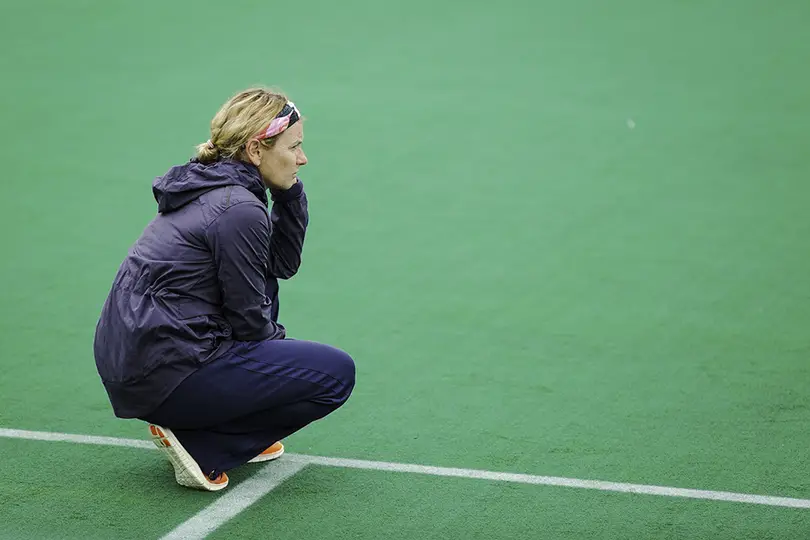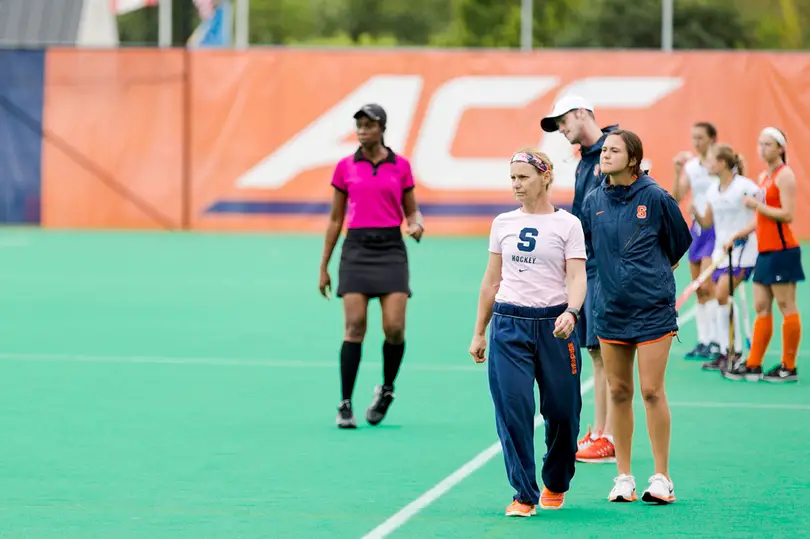Ride On: Bradley’s childhood lessons of friendship, hardship fuel coaching dominance
A yellow Schwinn 10-speed bike served as Ange Bradley’s car. She rode it on her Daily Times paper route and to the pool where she lifeguarded to earn money to pay for field hockey camps.
Riding home, she had M-80 firecrackers thrown at her and car doors opened into her bike. As a teenager, Bradley knew which streets and corners to avoid based on the spider-tattooed gang members, which she knew as Warlocks, that hung around them.
She took the long way around the bridge on Bridge Street to her row house off Fairmont Road in her hometown of Drexel Hill, Pennsylvania. There, her older brothers would sometimes call her upstairs at dinner time, only to quickly eat her meal when she left the table. No sympathy from Mom.
“What are you doing that for? Why are you listening?” Bradley’s mother would ask.
With or without dinner, Bradley went to bed in the room she shared with her two sisters in the three-bedroom house her nine-person family called home. Each of her family members was so different, one wouldn’t think they were related, Bradley said.
Her second family was the five or so friends Bradley played and fought with from adolescence into adulthood. She said she doesn’t have many friends, but despite their differences, those friendships remain. The same coming-together of people that forged her childhood way out of her overcrowded, underfunded home is her favorite part of coaching field hockey.
It’s what drove her to a Hall of Fame playing career at Delaware, into coaching at Goucher College (Md.) and ultimately to the head of a Syracuse program that annually contends for a national title — all while molding a team of players from around the country, and world, that come from a development system she never could’ve afforded.
“It was your solace going out there to just play and have fun and be away from all the other stuff,” Bradley said.
Her “other stuff” was living with little to nothing beyond food, clothes, good advice and just wanting to get out. Families fractured by alcoholism, drug abuse and divorce plagued her other friends.
Among them, Bradley was lucky. They all knew their best way out of Drexel Hill was through scrapping their way to field hockey scholarships. She remembers one neighbor she grew up playing with who went to jail on explosives and illegal weapons charges. Another childhood friend went to jail, too.
“My parents didn’t go to college, her parents didn’t go to college,” said Jackie Gerzabeck, Bradley’s lifelong friend, Upper Darby High School teammate and former Old Dominion star. “But we both went to college.”
At University of Delaware practices, Bradley’s teammates watched on as she played goalkeeper against Monique Scally — an attacker and fellow Drexel Hill native — as the two players shoved each other in pursuit of every ball, shot and rebound. Their Blue Hens teammates thought that Bradley and Scally would surely come to blows.
“When you’re playing, it’s no-holds-barred. Kill or be killed,” said Scally, now a doctor. “ … That was definitely something that the other girls on our team were not used to.”
The roommates weren’t trying to actually kill anyone — just the prospect of defeat. They had grown up pedaling to and practicing on tennis courts. But after UD practices Bradley and Scally would head out for a beer at Deer Park Tavern. It was the continuation of a childhood tradition.
“You just learn those things,” Bradley said, “because if you don’t, you’re not going to survive.”
Bradley loves that lesson and teaching it to her players from six countries and six states. They’re among the best from an elite pyramid of travel and expense-heavy club teams. It’s her job to turn them into a cohesive unit that puts aside its own differences and wins field hockey games. Brad-ley’s taken 263 of them.
Heather Susek, a former Orange forward, came to SU talented, but quiet. Bradley made her into a leader by example, then an outspoken feature of the offense before Susek wrapped up her SU career in 2011 with 19 goals and seven assists.
“I think when it was happening I didn’t really notice so much,” Susek said. “Then after the fact it’s just ‘Wow.’ It kind of hits you all at once.”
Bradley doesn’t share much of her hardened history with her players. She’s not hiding from it, she said. It’s just kept beneath the surface with the quiet assuredness of someone who’s seen and knows enough not to overexpose what she comes from.
She encourages players that stay in Syracuse during the summer to bring a bike, but they don’t know how to change flat tires. One player didn’t know her bike had 30 gears or how to change them.
“I had to teach them how to change a tire,” she said, wheezing with laughter, “‘cause they got a flat. They’re like, ‘Ange, I got a flat, what do I do?’ I’m like, ‘Wow.’”
The players she mentors are products of a changed game. Bradley played on grass and some turf. The game was slower. As a goalie, she didn’t wear a facemask, just a mouth guard. And if she and her friends that formed the core of Upper Darby High School’s varsity team wanted to play a tournament or a camp out of town, they had to hitch rides with kids from somewhere else.
Parents in Drexel Hill don’t have time to drive their kids to practice. It’s why when she goes back to visit her father and sister on the same street she grew up in, the hometown her friends once starred in isn’t where she’s recruiting. It’s just a home base to stay at while scouting further North and West into Pennsylvania’s suburbanized field hockey hotbeds.
“They haven’t really had any success since the ‘80s, quite honestly,” Bradley said.
As an athlete and a kid, Drexel Hill was her rugged home playground. There she shot baskets with friends, passively playing and talking; drinking and otherwise getting into trouble without getting caught, eating bad food and trying to play field hockey games afterward.
But she also pushed her friends to train harder and longer. Arlington Cemetery sits behind Upper Darby High School. It was too big for cops to see much inside. It’s where local kids bought and used drugs.
Bradley and her friends ran two-mile loops around it.
Now when Bradley rides her bike, it’s not in place of a car. It’s for fun. Triathlons both deepen and relieve the lines of self-induced stress on her face. They’re an escape from the professional work ethic that drives her to in-season 80-hour work weeks as she leads the SU team best-positioned to snag the school’s first national championship in a women’s sport.
On Sunday, Bradley’s Orange had just buried Ball State, 5-0. It was 3 p.m. and no time to celebrate. In three hours, she planned to start watching game film again at home.
Getting home means arriving at the house overlooking a golf course where she hosts her players about once a year.
Coming home used to mean the conclusion of a day that started with her racing to high school on her yellow Schwinn — “always pushing the edge,” Bradley said. She’d come back from whatever game she had played that day.
Upon entering the row home, Bradley’s mother would have just one question for her, the kind “you’re not supposed to ask nowadays,” Bradley said.
“Did you win, did you lose?” Bradley’s mom asked. She won.
Published on September 8, 2014 at 12:09 am
Contact Jacob: [email protected] | @Jacob_Klinger_






